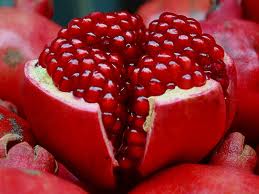|
Pomegranate

| Botanically, it is a small size fruit-bearing deciduous tree belonging within the Lythraceae family, of genus: Punica. The fruit is thought to originate in the Sub-Himalayan range of North India. Scientific name: Punica granatum. The tree grows to about five and eight meters tall. It is cultivated at a commercial scale in vast regions across Indian sub-continent, Iran, Caucuses and Mediterranean regions for its fruits. Completely grown-up tree bears numerous spherical, bright red, purple, or orange-yellow colored fruits depending on the cultivar types. This slightly peculiar fruit has been thought to hold legendary powers for centuries. Persians believe Eve actually ate a pomegranate when she plucked from the tree of knowledge in the Garden of Eden, not an apple. Ancient Egyptians buried their dead with pomegranates because they believed it offered eternal life.
|
This fruit is also featured in mythology and tradition as a symbol of good tidings. Greeks break open a pomegranate at wedding celebrations and the Chinese eat candied pomegranate seeds for good luck. Researchers are discovering the truth surrounding the pomegranate’s powers, proving why this exotic fruit has claimed such a fabled place in cultures throughout the ages. Scientists conducting research on the many health benefits of pomegranates have made some incredible discoveries.
First, organic pomegranates are full of antioxidants. These are compounds and enzymes known for keeping low-density lipoprotein (LDL) or “bad” cholesterol from oxidizing and causing atherosclerosis, or hardening of the arteries.
Antioxidants also buffer the effects of free radical damage to your cells caused by oxidation. Free radicals are produced by functions within the body and elements outside the body, such as radiation from the sun. You can’t stop free radical occurrence and oxidation but you can consume foods that help neutralize their potential damage.
Pomegranate is among the most popular, nutritionally rich fruit with unique flavor, taste, and health promoting characteristics. Along with berries, and some tropical exotics such as mango, it too has novel qualities of functional foods often called as “super fruits.”
Punicalagin is a polyphenolic anti-oxidant compound found abundantly in the pomegranate juice. Studies suggest that punicalagin and tannins are effective in reducing heart-disease risk factors by scavenging harmful free radicals from the body.
The fruit is an also good source of antioxidant vitamin-C, provides about 17% per 100 g of daily requirement. Consumption of fruits rich in vitamin C helps the body develop resistance against infectious agents by boosting immunity.
Further, it is an also good source of many vital B-complex groups of vitamins such as pantothenic acid (vitamin B-5), folates, pyridoxine and vitamin K, and minerals like calcium, copper, potassium, and manganese.
|